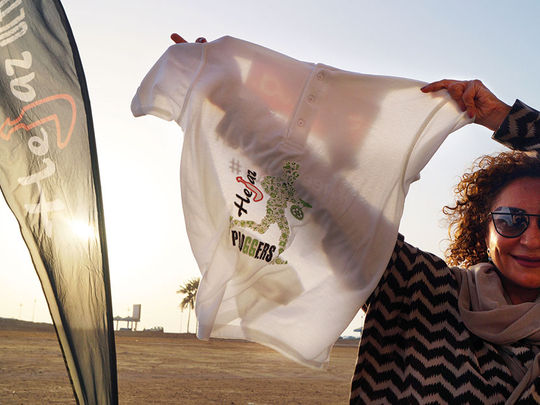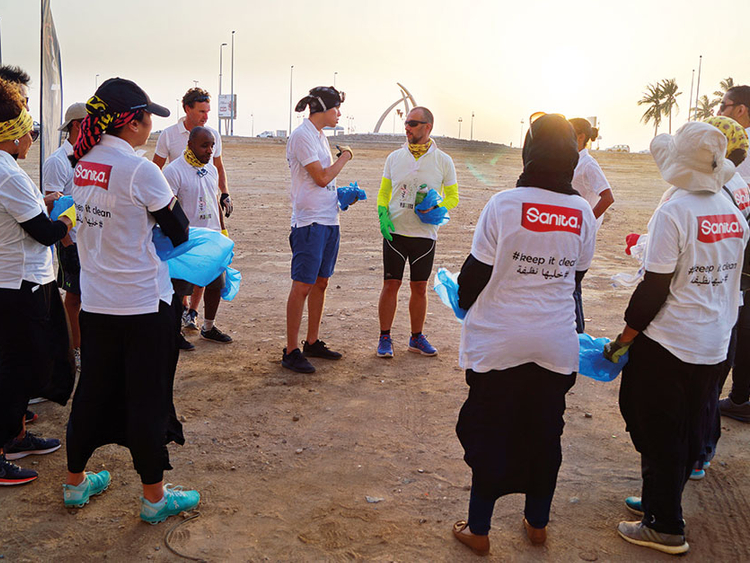
The Red Sea city of Jeddah seamlessly combines the old and the new, the past and the present. It is the financial capital of Saudi Arabia, and is also it is blooming into the country’s top tourist location as Saudi Arabia rapidly opens up to leisure travellers.
But, lately some things have also been changing for residents in Jeddah. The sense of community is growing, with citizens and expatriates coming together to fight wastage, and do their bit for the environment. This has led to the emergence of a new movement – ‘plogging’. It is the first of its kind in the Middle East. Running is good for health, and picking up litter is obviously good for our environment. Ploggin’ brings both together. A movement that began in Sweden, plogging involves walking, jogging or running while picking up the litter you see along the way. Plogging is attracting a growing following in Europe and America.
In Jeddah, runners, joggers and walkers can be seen picking up all sorts of litter, from the beaches and the streets. Thousands of water bottles, straws, cigarette butts and plastic bags have been picked up and disposed for recycling.
Taha Boksmati is an engineer working at the General Authority of Meteorology and Environmental Protection (GAMEP). And he’s credited with the bringing plogging to Saudi Arabia. Boksmati said he discovered the movement through a video his friend posted online.“We launched it on June 18 this year. A short while after being appointed Chief Environmental Officer of Hejaz Ultra [a Jeddah-based running group] by the founder Fabrice Laborie, I suggested this activity,” Boksmati said.
Hejaz ploggers meet at Jeddah’s Medd Café on Saturdays, Mondays and Thursdays at 6pm. Members are free to walk, jog or run and the activity lasts for one hour.
“With our sponsor Sanita, we are now funded to provide our members with T-shirts, sanitisers, gloves, and bags prior to every plog.Keeping our activity environmentally sustainable, we made sure our methods and materials are eco-friendly. For instance, we only use biodegradable bags and strive to keep our operational waste to a minimum,” he added.
Global waste is having a dire impact on the environment, with its buildup reaching threatening proportions.
The World Bank says rapid population growth and urbanisation is expected to raise the global municipal waste generation to 2.2 billion tons by 2025. According toUN reports, more than 8 million tons of plastic is leaked into the ocean each year – the equivalent of dumping a garbage truck of plastic every minute. Additionally, plastic accounts for up to 80 per cent of all litter in our oceans. Proper management of waste is crucial for building sustainable and liveable cities, but it remains a challenge for many countries.
In Saudi Arabia, the GAMEP warned earlier this year against the increasing amount of waste being generated in the kingdom.
It said in a report published by Al Hayat daily that of the total 13.6 million tons of waste produced by 169 cities, towns and villages in Saudi Arabia annually, at least 6 million tons originate in the three largest cities – Riyadh, Jeddah, and Dammam.The national census indicates that 65.6 per cent of Saudi Arabia’s population is concentrated in these three cities.
Jeddah residents are trying to raise awareness about the matter, highlighting the importance of reducing plastic and switching to eco-friendly alternatives. Ploggers eventually added segregating litter to the waste-prevention efforts. Each plogger announces before the start whether they will be collecting plastic, paper, cigarette butts and so on. The bags are then dumped into categorised recycling bins. They aim to spread to more districts in Jeddah, before eventually expanding to other cities.
Through plogging, the group wants to make sure its environmental message of not littering in the street gets out there. “Whether it is someone else’s garbage or not, one should not be fooled – if I trash my spot, its trashing someone else’s because we share one environment,” Boksmati said.
Amira Gentapa, a software engineer who was born and raised in Jeddah, joined Hejaz Ploggers because she wanted to be more proactive when it comes to the environment.
“I’ve always loved the outdoors and appreciate the beauty of nature, whether it is the oceans, forests, deserts, or wildlife. I hate how humans are staining its beauty,” Gentapa said.
“I am conscious about the environment, and make it a point not to litter, and to reprimand people when I see them littering.”
Gentapa said it is a dream to one day see Jeddah’s seaside litter-free.
Members of Hejaz Ploggers told Gulf News they have mostly received positive reactions from bystanders. “Most reactions were confused faces, because seeing a girl running and collecting trash is a rare sight, but a few encouraged us and cheered us, while a few kids approached us to see what we were doing,” Gentapa said.“At first, people were curious. Were we running or picking up litter? But as soon as they realised, they seemed to appreciate it,” Jawahir Walid, another member, said.
Another local initiative, called ‘Team Up to Clean Up’ shares the same hopes for Jeddah. It was started by Saudi Arabian Airlines Captain Essam Jawa and his family. Jawa has been a pilot for the airline for over 35 years. “It all began a long time ago when my family and I used to go jogging and walking in the Basateen district of Jeddah. It was quite a clean place, where we enjoyed our regular sports activities. But gradually, the place became dirty and garbage was everywhere. We decided with the help of our friends to clean it up and revive its beauty,” Jawa said.
The aim is to raise awareness about littering and its effect on residents and the environment. We’ve brought together groups of volunteers and environmental enthusiasts in several districts across Jeddah,” he said.
The group recently started separating the items they pick up, and delivering them to potential recycling plants. They meet at least 2-3 times a week in different locations. “We will clean in public areas or populated spots, where people shop or perform their usual sports activities, in order to get more exposure for our initiative and gain public support,” he added.
Diana Rifai is a freelance journalist based in Jeddah. She specialises in human rights, the refugee crisis, politics, environment and community news in the Middle East.













